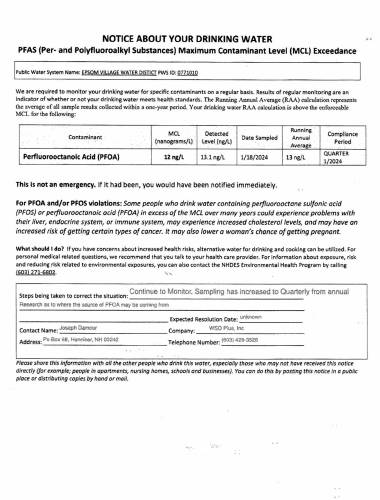‘Forever chemicals’ in Epsom drinking water will cost customers $6.15 million, most of it from state

Notice of water contamination sent to Epsom residents SRUTHI GOPALAKRISHNAN—
| Published: 02-10-2025 6:33 PM |
Edward Orr, like many residents of Epsom’s Water Village District, was alarmed to see a notice tucked inside his April water bill warning of forever chemicals in his drinking water.
From that moment on, he couldn’t shake the unsettling thought: Had the water he’d been drinking for years played a role in his wife’s thyroid issues? What about his dog, who died last year with no clear cause?
“I’m getting terrible water. I don’t need to be poisoning my family,” said Orr. “My cat’s drinking the same water. So what am I doing here?”
Orr lives within the boundaries of Epsom’s Water Village District, which supplies water to 325 customers, including residences, businesses and the Epsom Central School.
The district relies on two wells. A routine water test in January 2024 revealed that one of the two contained 14 parts per trillion (ppt) of PFOA — a specific type of PFAS commonly used in waterproof coatings.
That level is just above the state limit of 12 parts per trillion.
Over the past few years, more and more wells across New Hampshire — both private and public — have tested positive for elevated levels of PFAS, often referred to as “forever chemicals.”
Amy Rousseau, the state’s PFAS Response Administrator, explained that since New Hampshire implemented stricter standards in 2020, more water sources have been flagged.
Article continues after...
Yesterday's Most Read Articles
 New Hampshire legalizes public alcohol consumption in designated ‘social districts’
New Hampshire legalizes public alcohol consumption in designated ‘social districts’
 New Hampshire providers brace for Medicaid changes that reach beyond healthcare
New Hampshire providers brace for Medicaid changes that reach beyond healthcare
 Warner town administrator granted restraining order against selectman
Warner town administrator granted restraining order against selectman
 Hotel makeover underway in downtown Concord
Hotel makeover underway in downtown Concord
 Opinion: Dear Gov. Ayotte, let’s talk about the books
Opinion: Dear Gov. Ayotte, let’s talk about the books
 State rules Epsom must pay open-enrollment tuition to other school districts, despite its refraining from the program
State rules Epsom must pay open-enrollment tuition to other school districts, despite its refraining from the program
Before then, the state followed the federal Environmental Protection Agency’s health advisory of 70 parts per trillion for PFOA.
“We see that jump again,” Rousseau said. “We see a big increase of those affected by going down to that level as well. So with every decrease, we do see more people affected.”
In Epsom, the first test showing elevated levels came back in July 2022. Despite that, residents were never provided supplemental water.
Water commissioner Samantha Lazo explained that parts per trillion is a tiny measurement and that the district has always mixed water from both wells.
Rousseau said diluting the contaminated water is an acceptable remedy for public water systems to reduce contamination levels.
But the real danger of these chemicals lies in long-term exposure over 10 to 20 years, she said.
The district is now scrambling to fix the issue, but the solution comes with a steep $6.15 million price tag.
Much of that burden falls on the customers who draw their water from the public wells — not the entire town of Epsom.
“We are working on getting this bond passed so we can get a treatment system installed, and we did send out literature and kind of give people an overview of ways that they can protect themselves now from the water,” said Lazo.
Frustrated by the district’s handling of the situation, Orr said the cost, which includes $1.5 million to relocate the pump house out of a 100-year floodplain, is unnecessary at this point.
“You’ve done nothing all these years, and now you expect me to foot the bill for all this extra work,” Orr said.
Lazo said that pumping water from the well into the treatment vessels remains essential, making the installation of a new pump unavoidable.
Of the total cost, the district will be responsible for $2.55 million, and the rest will be covered by the New Hampshire Department of Environmental Services. The bond will be paid over 30 years.
That means big jumps in quarterly water bills by about 60%. Orr, who currently pays $85 every three months, could soon see his bill rise to $136. That’s an annual jump from $340 to $544.
Lazo acknowledged the financial strain, especially since many residents live on fixed incomes. But she also pointed out that local businesses, whose water usage is far higher than the average household, will help offset the burden.
If the bonds aren’t approved, Lazo said the district plans to hold an emergency meeting to explain the importance of cleaning up the PFOA contamination and address the district’s noncompliance with state regulations.
“Eventually DES will start slapping fines, which of course will then be passed on to the users of the water system,” said Lazo. “Then from there I don’t really know exactly what would happen, but it wouldn’t be anything that would be great.”
A public hearing on the bond proposal is set for Feb. 12 at 6 p.m. at Epsom Central School.
Sruthi Gopalakrishnan can be reached at sgopalakrishnan@ cmonitor.com







 ‘A little piece of everything I like’: New Pittsfield barbershop brings more than a haircut to downtown
‘A little piece of everything I like’: New Pittsfield barbershop brings more than a haircut to downtown NH judge decides to pause Trump’s birthright citizenship order
NH judge decides to pause Trump’s birthright citizenship order Canterbury honors ‘real heroes’ with updated Military Veterans’ Project
Canterbury honors ‘real heroes’ with updated Military Veterans’ Project Look, up in the sky! It’s… an Airstream trailer?
Look, up in the sky! It’s… an Airstream trailer?
